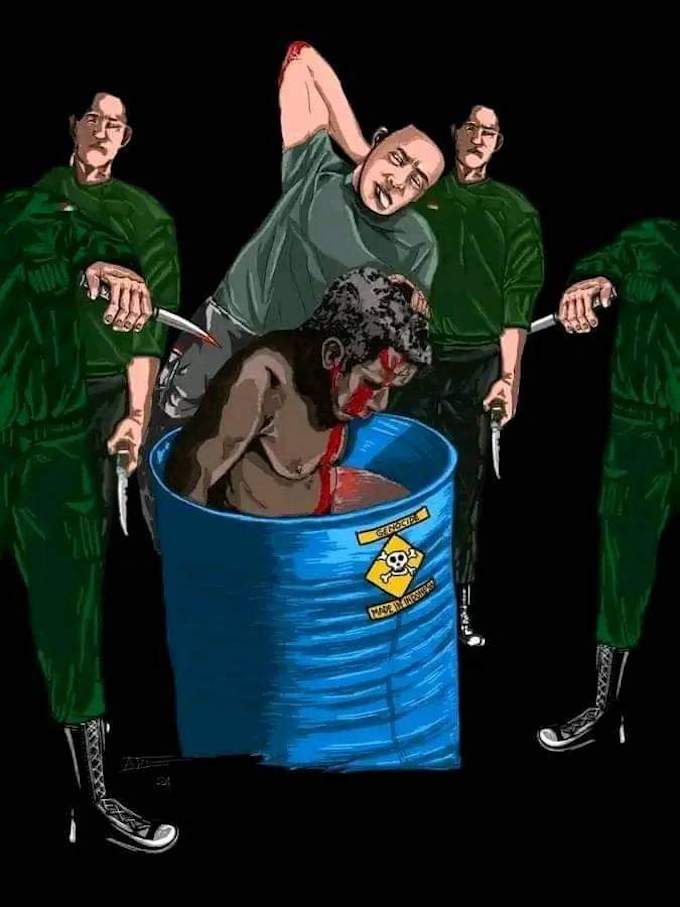COMMENTARY: By Ronny Kareni
Recent videos depicting the barbaric torture of an indigenous Papuan man by Indonesian soldiers have opened the wounds of West Papua’s suffering, laying bare the horrifying reality faced by its people.
We must confront this grim truth — what we witness is not an isolated incident but a glaring demonstation of the deep-seated racism and systematic persecution ravaging West Papuans every single day.
Human rights defenders that the videos were taken during a local military raid in the districts of Omukia and Gome on 3-4 February 2024, Puncak Regency, Pegunungan Tengah Province.
- READ MORE: The Jakarta Post editorial in response to the torture
- Wenda condemns ‘sadistic brutality’ of Indonesian torture of Papuan – calls for UN action
- VIEW THE VIDEOS: WARNING: Graphic violent content
- Other reports on West Papua and self-determination

Deeply proud of their rich ethnic and cultural heritage, West Papuans have often found themselves marginalised and stereotyped, while their lands are exploited and ravaged by foreign interests, further exacerbating their suffering.
Indonesia’s discriminatory policies and the heavy-handed approach of its security forces have consistently employed brutal tactics to quash any aspirations for a genuine self-autonomy among indigenous Papuans.
In the chilling footage of the torture videos, we witness the agony of this young indigenous Papuan man, bound and submerged in a drum of his own blood-stained water, while soldiers clad in military attire inflict unspeakable acts of violence on him.
The state security forces, speaking with a cruel disregard for human life, exemplify the toxic blend of racism and brutality that festers within the Indonesian military.
Racial prejudice
What makes this brutality even more sickening is the unmistakable presence of racial prejudice.
The insignia of a soldier, proudly displaying affiliation with the III/Siliwangi, Yonif Raider 300/Brajawijaya Unit, serves as a stark reminder of the institutionalised discrimination faced by Papuans within the very forces meant to protect civilians.
This vile display of racism underscores the broader pattern of oppression endured by West Papuans at the hands of the state and its security forces.
These videos are just the latest chapter in a long history of atrocities inflicted upon Papuans in the name of suppressing their cries for freedom.
Regencies like Nduga, Pegunungan Bintang, Intan Jaya, the Maybrat, and Yahukimo have become notorious hotspots for state-sanctioned operations, where Indonesian security forces operate with impunity, crushing any form of dissent through arbitrary arrests.
They often target peaceful demonstrators and activists advocating for Papuan rights in major towns along the coast.
These arrests are often accompanied by extrajudicial killings, further instilling intimidation and silence among indigenous Papuans.
13 soldiers held over alleged torture of Papuan – Archipelago – The Jakarta Post #jakpost https://t.co/V6mUCH35h7 pic.twitter.com/Vxat1Lrlgy
— The Jakarta Post (@jakpost) March 26, 2024
Prabowo leadership casts shadow
In light of the ongoing failure of Indonesian authorities to address the racism and structural discrimination in West Papua, the prospect of Prabowo’s presidential leadership casts a shadow of uncertainty over the future of human rights and justice in the region.
Given his controversial track record, there is legitimate concern that his leadership may further entrench the culture of impunity. We must closely monitor his administration’s response to the cries for justice from West Papua.
It is time to break the silence and take decisive action. The demand for the UN Human Rights Commissioner to visit West Papua is urgent.
This is where the Melanesian Spearhead Group (MSG), with its influential members Fiji and Papua New Guinea, who were appointed as special envoys to Indonesia can play a pivotal role.
Their status within the region paves the opportunity to champion the cause and exert diplomatic pressure on Indonesia, as the situation continues to deteriorate despite the 2019 Pacific Leaders’ communique highlighting the urgent need for international attention and action in West Papua.
While the UN Commissioner’s visit would provide a credible and unbiased platform to thoroughly investigate and document these violations, it also would compel Indonesian authorities to address these abuses decisively.
I can also ensure that the voices of the Papuan people are heard and their rights protected.
Let us stand unyielding with the Papuan people in their tireless struggle for freedom, dignity, and sovereignty. Anything less would be a betrayal of our shared humanity.

